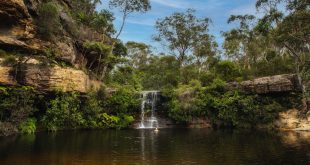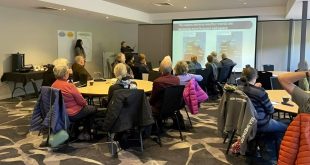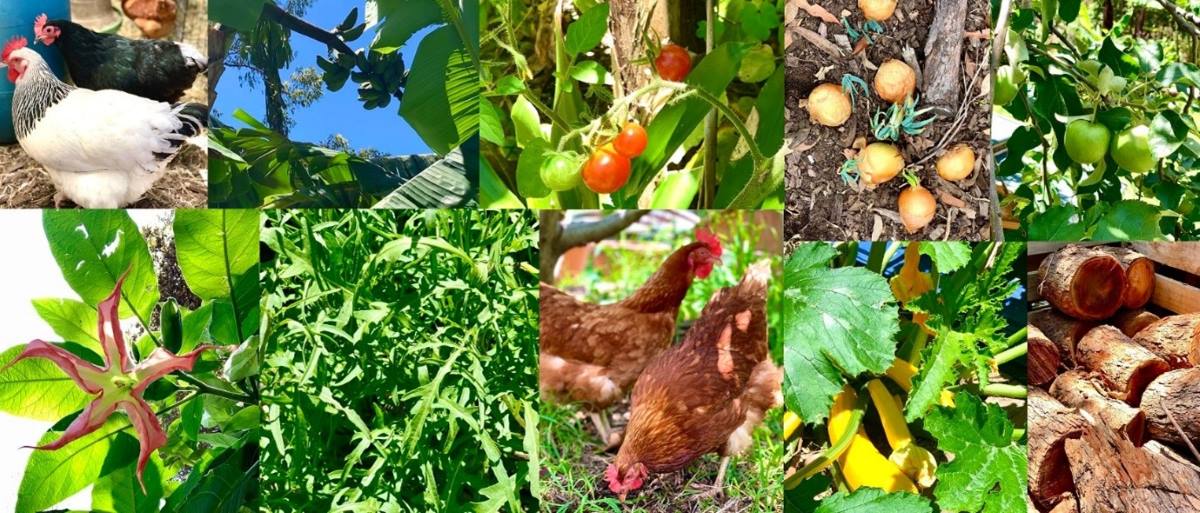
The Edible Garden Trail is Amanda’s opportunity to showcase her sustainable garden alongside other amazing spaces in Springwood, Faulconbridge and Sun Valley. (Photo: The Urban Gardener)
Story by Gabiann Marin
The Edible Garden Trail is on again in 2024, and local gardener and permaculture enthusiast Amanda Argent will open the gates of the Urban Farmer Blue Mountains to welcome the community into a garden designed around sustainability, community and creativity.
Key Points:
- The Edible Gardens Trail celebrates food cultivation and sustainable practices, offering a way for everyone to discover the beauty, as well as the environmental and nutritional benefits, of sustainably created, edible plant gardens.
- The Urban Farmer Blue Mountains offers opportunities for volunteers to connect with nature, learn permaculture practice and contribute to the creation of a unique community/creative garden.
- Permaculture and edible planting helps reduce the use of pesticides and poisons in our natural environment, benefitting people, plants and animals in the local area.
Wandering along a blooming pathway, dappled sunlight falling across my arms, I am welcomed into Artemis’s Temple, an enclosed edible garden space, watched over by a weather worn statue of the beautiful goddess herself, gazing out though tendrils of grape vines across the blooming garden around her.
It’s easy to get lost in the greenery and imagine that I am far from civilisation, in an older, more ancient world, where gardens formed gateways between human endeavour and the cycles of nature.
The temple is just one of the many bespoke spaces Amanda Argent, AKA the Urban Farmer, has created in her half-acre Springwood garden, which, by the standards of many properties on this year’s Edible Garden Trail, is small, although perfectly formed.

A statue of the Greek Goddess Artemis gazes over the Urban Farmer garden in Springwood (Photo: G.Marin)
‘One of the real challenges for me is working out how to make half an acre feel bigger,’ Amanda remarks as she considers all her plans for the space. Although not entirely completed, Amanda’s inspiration and overall vision is clear as we walk the land, each part of the garden carefully and thoughtfully planned for a different sustainable use; to nurture a different spiritual need or creative aspect of the community.
From the proposed men’s space – replete with workshop and other additions, to the children’s talking circle, or the Zen garden overlooking the Blue Mountains National Park, and up into the pond performance space, (currently under construction) where storytellers, musicians and performance artists will be invited to perform for community gatherings, each area has a purpose and a function. The communal circle, the most recent addition to the space, creates an effective centrepiece to the design – where visitors can sit, listen and converse.
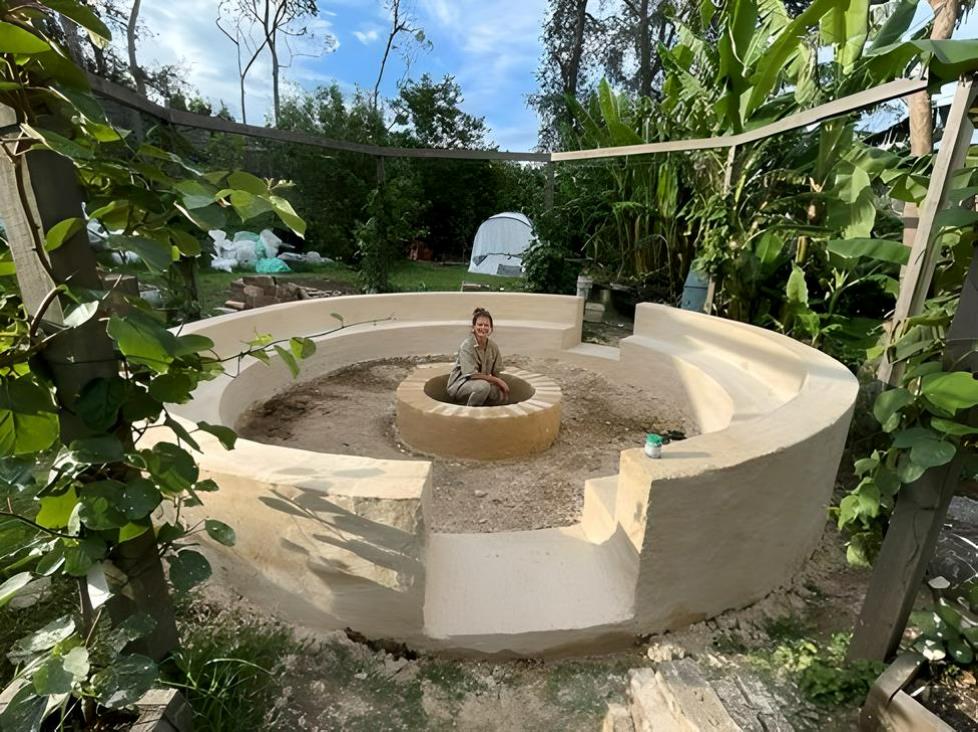
Amanda Argent takes a well-deserved break after the construction of her impressive Communal circle – a centrepiece of her community orientated garden. (Photo: The Urban Gardener)
A plump black chicken clucks happily beside us as we explore further. The chicken provides more than free range eggs, she is also a contributor to the sustainability of the garden itself, removing pests alongside her other brown feathered sisters, as she scratches and aerates the soil, helping to create enriched earth to use throughout the rest of the property, a key element of Amanda’s environmentally friendly approach.
Originally designed in 2020, Amanda had to wait until after the Covid lockdowns to start the work in earnest. With the help of community and volunteers, she completed enough to open much of the garden for the annual Edible Garden Trail in 2023, although this year the garden is even more impressive.
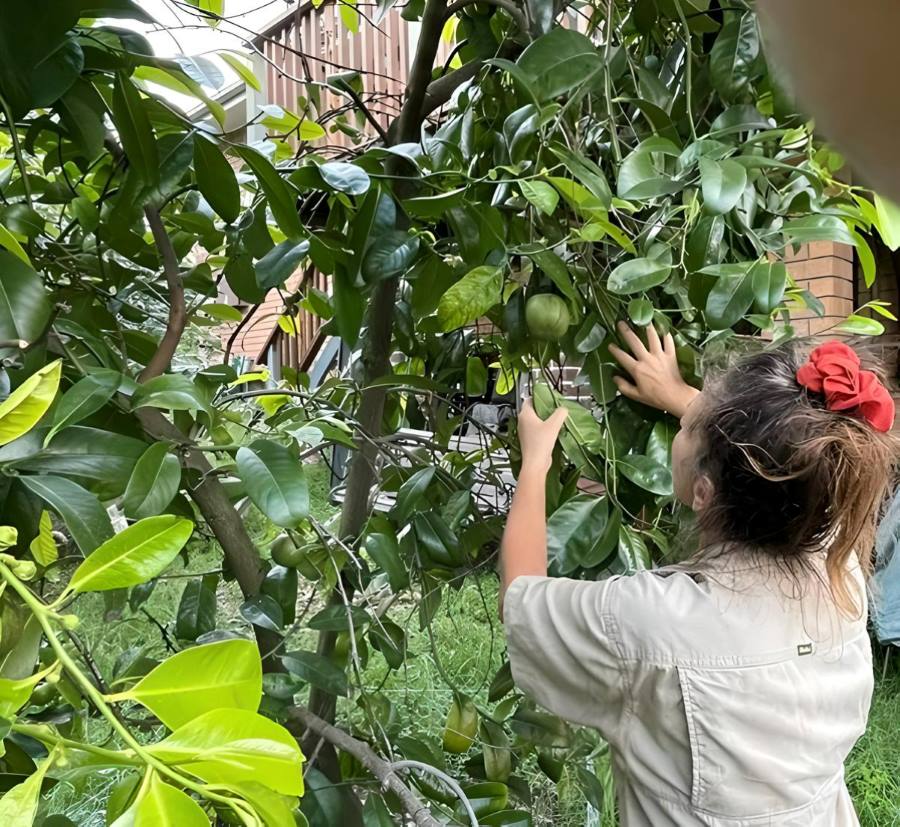
Amanda Argent discovering fruit on her black sapote (photo Amanda Argent/The Urban Farmer Blue Mountains)
The Edible Garden Trail, an annual Mountains-wide festival, celebrates and showcases permaculture and edible garden cultivation from Little Hartley to Lapstone. Originally envisioned by Blue Mountains sustainability advocate Susanne Rix, the trail is a great way to promote a more sustainable and environmentally friendly approach to our suburban landscapes.
Susanne realised that there was a love of gardens and gardening across the Blue Mountains, but that many local gardeners relied heavily on poisonous weed- and pest killers to manage their lawns and flowerbeds.
On the Edible Garden website Susanne explains “Sadly, many widely-used poisons kill not only the pests, but frogs, bees, good bugs and all manner of vital nutrients in the soil.” And as a result, many of these beautiful gardens were unintentional assassins of the natural environment.
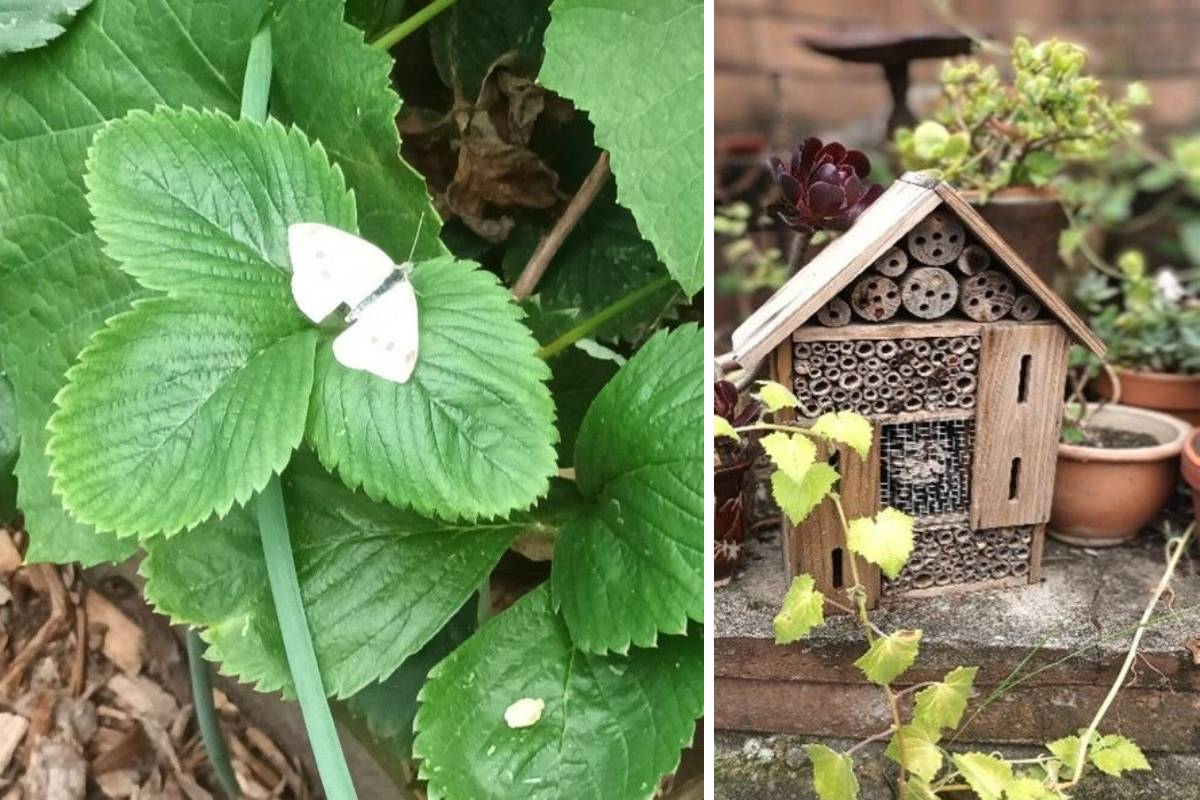
Permaculture and sustainable gardening help to protect natural pollinators and native wildlife, as well as people. (Photo: G. Marin)
Susanne believed the principles of permaculture, a style of gardening where you use the natural protections of the plants themselves, through companion planting as well as using composting, innovative water management and naturally occurring predators to combat pests and weeds, was a great alternative to environmentally damaging poisons and water wasting practices.
She established the Edible Garden Trail to demonstrate that sustainable food-centred gardens were not just better for the planet, but could be visually appealing. The first trail was launched in 2018 and the idea has grown into trails across the globe and is a favourite event in the Blue Mountains calendar.
Now organised by the Blue Mountains Food Co-op in Katoomba, the local Edible Garden Trail has gone from strength to strength with over forty gardens across the mountains opening their gates to visitors in 2024. Springwood and surrounds have particularly embraced the edible challenge, offering eight wonderful garden experiences this year – from Faulconbridge to Sun Valley.
While some areas in the Mountains must overcome issues like poor soil and overall climate challenges when considering how to best utilise the natural environment, Springwood is particularly blessed when it comes to creating edible gardens.
‘It has been said that Springwood possesses the perfect climate for growing food. Not too cold and not too hot.’ Jacqueline Forster, the Coordinator of The Edible Food Trail, explains.
The key to a successful edible garden, Jacqueline reveals, is flexibility, creativity and vision, attributes that underline the whole ethos of Amanda Argent’s Urban Farmer Blue Mountains initiative, alongside her total commitment to building a community-focused space for everyone to enjoy, not just during the Edible Gardens Trail – but beyond.
“If I had to have a catchphrase, it would be; ‘Building and Connecting Community’” Amanda says, as she shares her future plans. “That’s who I am, deep within my heart space.”

Garden meets wilderness as a Zen Meditation Garden looks out over the protected Blue Mountains National Park (Photo G.Marin)
As an experienced permaculturist and teacher, Amanda has a huge amount of knowledge about sustainable horticulture and gardening, demonstrated through the sheer diversity of her garden produce. There are hybrid finger limes along the pathways, turmeric that bursts out enthusiastically from garden beds, a clutch of apple trees – not just the usual varieties, but also Black Sapote and White Sapote trees, which produce fruits which taste like chocolate and vanilla ice cream.
As we walk through the garden, I can’t resist sampling some of the extraordinary fruit and vegetables Amanda has cultivated. Many, like the ice cream apples, seem more like something you would find in the fantastical world of Willy Wonka, and his magical confection garden, than a small plot in the Australian bushland. I bite into a small capsicum, aptly named a Bishop’s Crown, because it looks more like a little red cap than a bell pepper. It tastes sweet and hot. The pink petals of the nearby Pineapple Guava melt on my tongue like icing sugar. “In the morning, it is even sweeter,’ Amanda smiles, popping one of the petals into her mouth.
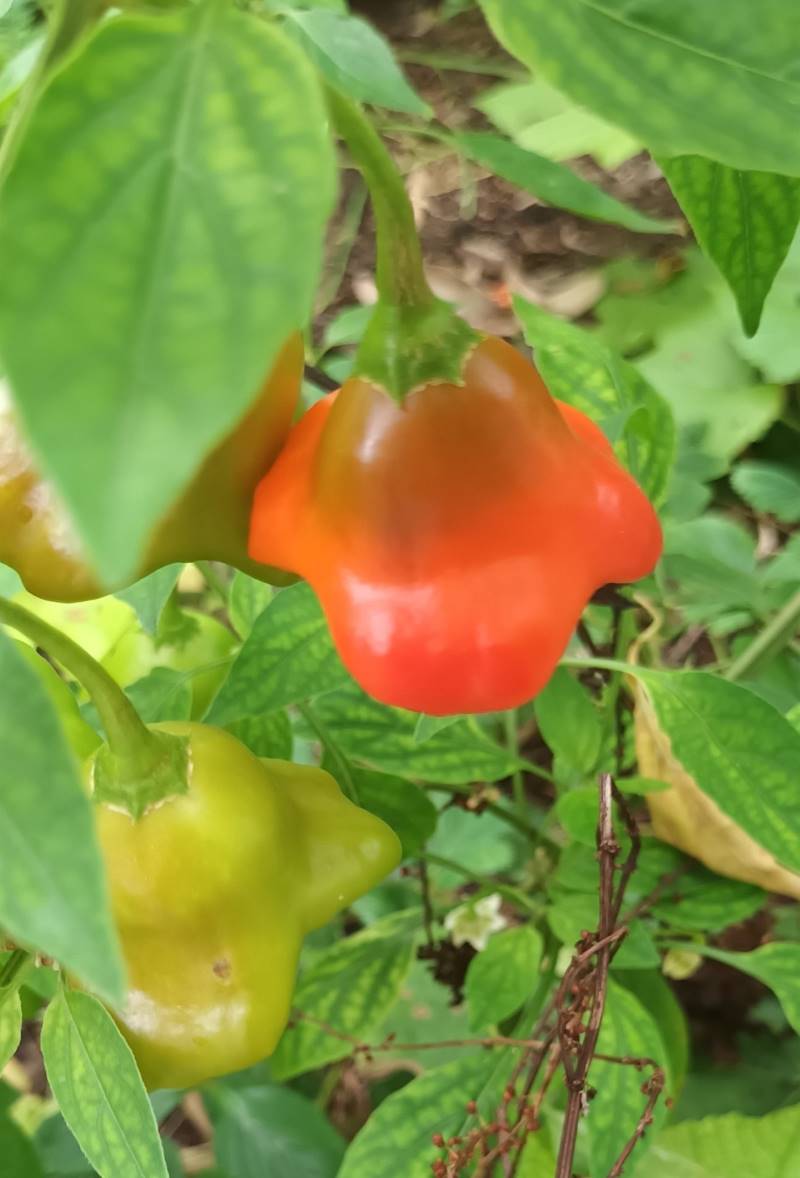
The unusual Bishop’s Crown Capsicum is one of the edible delights you can find in Amanda’s community garden. (Photo: G. Marin)
We arrive at one of the less developed areas, but Amanda’s enthusiasm does not wane; she asks for me to use my imagination and envision a ‘fish scale’ water catchment, a cabin which will host permaculture or creative workshops, and a hexagonal aquaponics system with a raised wicking bed system, an idea she gleaned from a visit to the Sydney Edible Garden Trail.
It is clearly Amanda’s drive and vision that has helped the Urban Farmer Garden take shape so fast, but she is quick to mention and appreciate the many friends and local permaculture enthusiasts who have contributed to turn this sloping block into an extraordinary feat of cultivated design.
She has also reached out to the local community, tradespeople and businesses who have helped her with donations of bricks, mulch, manure, straw and coffee grounds; greatly valued in a garden that follows the key permaculture principle to ”use and value renewable resources and services”.
Amanda has also accessed an international volunteer workforce who are offered accommodation and food, as well as education in the principles of permaculture and sustainable planting, in exchange for helping bring her garden to life.
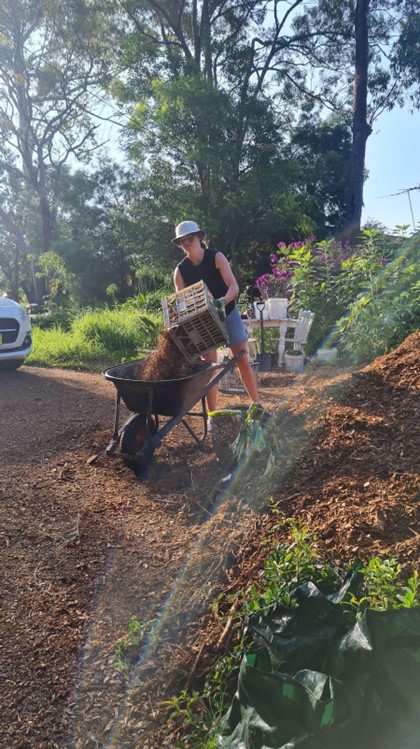
Volunteer Oceane Bertrand spreading bark mulch at the Urban Farmer Blue Mountains (Photo courtesy Amanda Argent/The Urban Farmer)
But still Amanda has invested much of her own money, including her accessible superannuation, into the creation of her innovative community co-creative space.
As she gears up for the impending Edible Gardens Trail, Amanda’s house is full to bursting with friends and current volunteers, all of whom beam at me as they make the evening’s meal.
”You have done so much work,“ Amanda tells Oceane Bertrand, a young volunteer from France who has spent the day removing couch grass and lining one of the beds with paper and bark mulch. ”I can’t believe how much you have done!”
”I feel like not so much,” Oceane responds, grinning, “because I didn’t have much time.”
”Well, it looks amazing.“Amanda replies.
The use of volunteers may have started as a practical solution to the financial and physical burden that Amanda had taken on, but it’s clear there is a real camaraderie and friendship between Amanda and those she has opened her home to. In return, many of them, like Oceane and the other current volunteer, Eya Akili, reflect Amanda ‘s passion for what the Urban Farmer can become.
Eya, originally from Syria, has a background in organising volunteers throughout Türkiye and the Middle East. Since arriving on Amanda’s doorstep she has dedicated herself to helping The Urban Farmer find more volunteers through utilising social media (www.instagram.com/happiness.volunteers/) and her international volunteer networks.
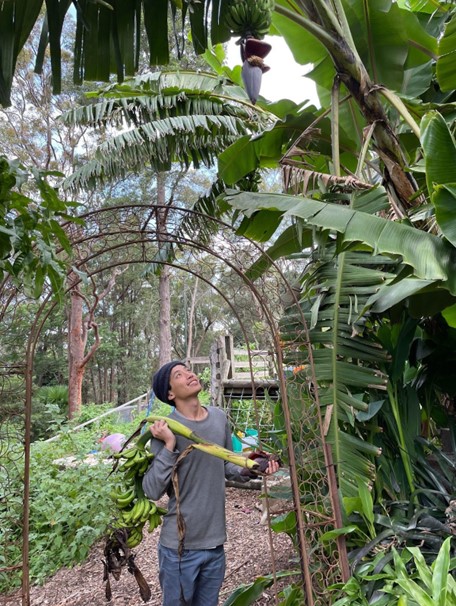
Volunteer Ryan Hoang at The Urban Farmer (Photo courtesy Amanda Argent/The Urban Farmer)
Amanda’s focus on sustainability, creativity and community makes The Urban Farmer one of the must-see gardens on this year’s Edible Garden Trail – which takes place on Saturday the 2nd and Sunday the 3rd of March. Check out all the fabulous Edible Gardens in the Springwood area and across the Blue Mountains on the Edible Garden Trail website: https://www.ediblegardentrail.com
Get Involved
Discover the Edible Gardens Trail
Visit one or more of the wonderful edible gardens as part of this year’s Edible Garden Trail taking place on the 2nd and 3rd of March 2024. There are a range of great gardens available on a full weekend pass ticket. Full details including directions, ticket purchases and opening hours are available on the Edible Gardens Trail website.
Volunteer
Amanda is happy to welcome any local gardener or enthusiastic tradesperson who would like to learn more about permaculture and contribute to the creation of the Urban Farmer’s creative community space – whether for an hour, a day or a longer period. Contact Amanda directly at the Urban Farmer on 0409 513 337 or email theurbanfarmerbluemountains@gmail.com
Learn about Permaculture
Blue Mountains Planetary Health are committed to helping promote sustainable gardens and horticulture, so keep an eye on the website for exciting free permaculture and planting workshops as well as come along to the inaugural Planetary Health Day on the 24th of February for free information, workshops and more. Find out more here: https://bmpluriversity.org/planetary-health-day/
Amanda Argent hosts free or affordable permaculture workshops through Hawkesbury Earthcare, Richmond – to find out more visit their Facebook page and start transforming your own outside space into a wonderful sustainable garden.
Permaculture Blue Mountains hosts educational nights on the first Tuesday of each month and are keen for people to get involved. Check out their Facebook page for upcoming events.
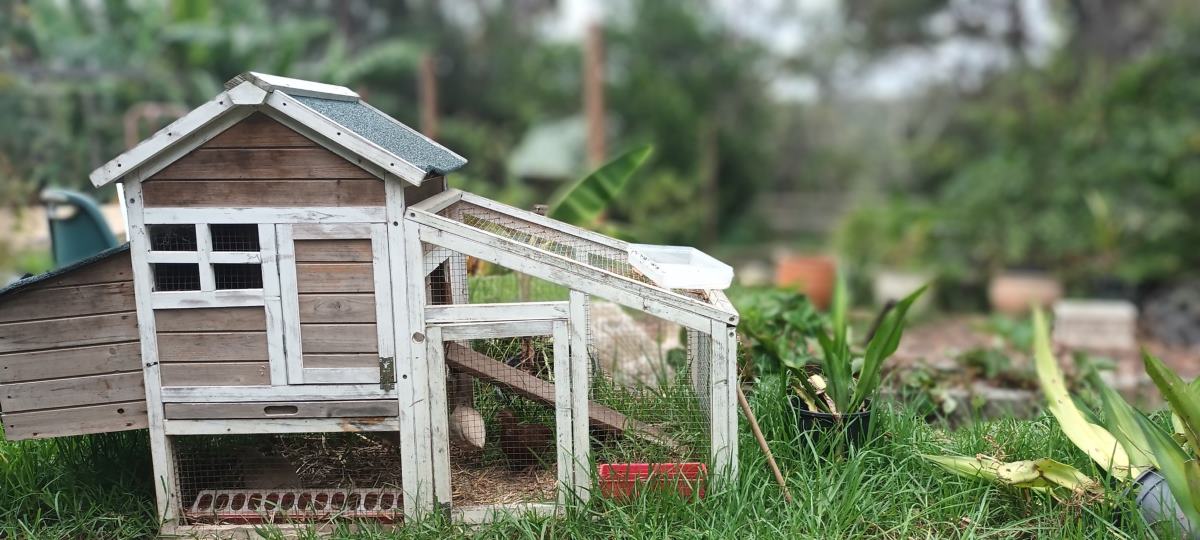
Chickens are great companion gardeners helping to reduce pest, aerate the soil and provide nutritious free-range eggs. (Photo: G.Marin)
Share this article:
This story has been produced as part of a Bioregional Collaboration for Planetary Health and is supported by the Disaster Risk Reduction Fund (DRRF). The DRRF is jointly funded by the Australian and New South Wales governments.



